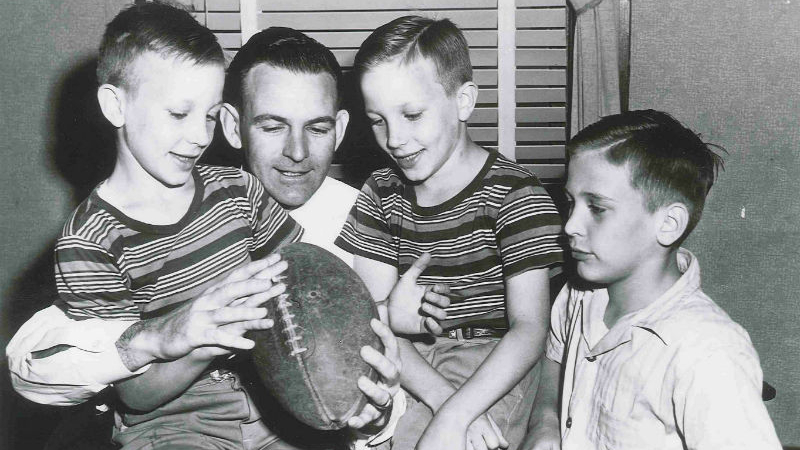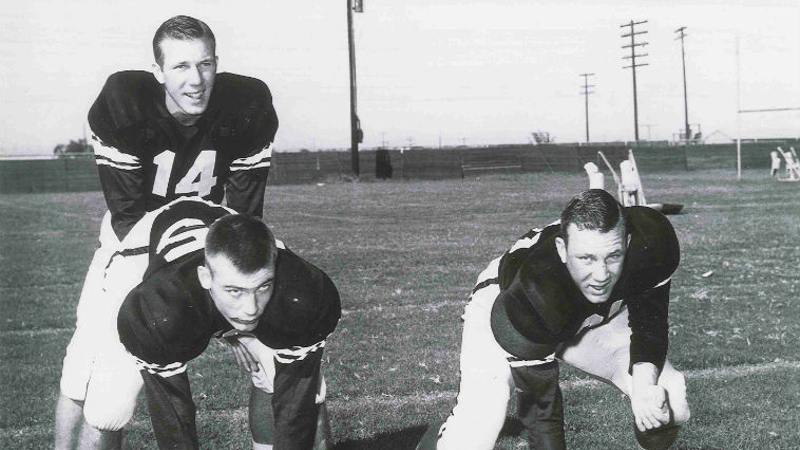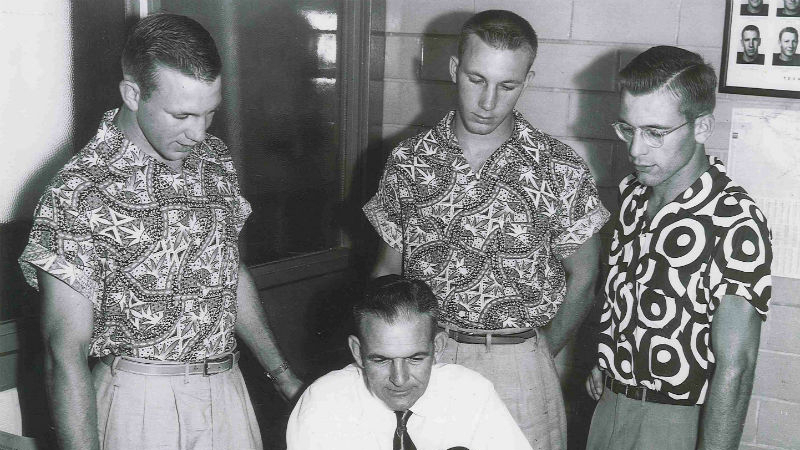Cooper Robbins Jr. was a talented football player at Breckenridge High School in Texas and at Texas A&M. Robbins graduated Texas A&M with an architecture degree and became a cost estimator and superintendent for a construction company. As he got older, Robbins became secluded, angry, forgetful, and his relationships with his family strained. At the age of 70, Robbins showed signs of dementia and behavior disturbance. Robbins passed away at the age of 83 in 2016. After his death, researchers diagnosed him with stage 4 (of 4) Chronic Traumatic Encephalopathy (CTE). His family shares his story so that others can be educated about CTE and to prevent future cases of the disease.
I am grateful to the Concussion Legacy Foundation for this opportunity to write about my father’s life after playing high school and college football. I enrolled him in the brain injury study when he was 81 years old. I was confident that Cooper Robbins Jr was a good man, and I wanted validation that he was not himself when he developed signs of dementia with behavior disturbance after the age of 70. He died at the age of 83, and sure enough, he was diagnosed with full-blown severe Stage IV CTE. On the phone call with results of the study, the researchers told me that he had done remarkably well, considering the extent of his brain injury.
My brothers & sister have been determined to remember him as the loving father that he was for most of his life, and we hold on to memories of the good times that we had together. His story is a testament to the resiliency of the human brain, as well as his remarkable strength of spirit. He was good-natured and kind-hearted up until his death, in between the episodes of behavior disturbances during his later years. Before describing some of the subtle, and later, more obvious signs of his brain injury, here is some background.

Cooper Polk Robbins, Jr. was born March 17, 1932 in Fort Worth, Texas, to Cooper and Elizabeth Robbins. His father, “Pop,” coached football at Northside High School & then Diamond Hill High School. The family moved to Breckenridge, Texas, when Cooper Sr. became Head Coach for the Breckenridge Buckaroos. Cooper Jr. played football with his twin brothers Ronald & Donald Robbins. Cooper Jr. played linebacker on defense and center on offense at Breckenridge High. Cooper Jr. was called “Tuffy,” as he was a real tiger on the football field. Here is his brother Ronald’s account of one football injury. “During the Graham game in high school his senior year, he made the player in front of him angry and the guy hauled off and slugged him in the mouth! They didn’t have face guards then. The blow knocked out Cooper’s four front teeth! He ran off the field with blood running down his jersey. Doc Payne grabbed the cleat pliers and pulled out the remnants of the four teeth. Ma Robbins nearly had a heart attack. She came running down from the grandstand and onto the sidelines, but the deed was done. The NERVE! Pulling out her boy’s teeth by the roots, and with dirty cleat pliers at that! Undaunted, Tuffy played the rest of the game!”

Cooper Jr. was an Eagle Scout, earning bronze and silver palms. He taught “Indian lore” and taught “Indian dances” at Camp Billy Gibbons for several summers. He was one of four Boy Scouts from Breckenridge Texas who went to the 1947 World Scout Jamboree in Moisson, France. After that, he joined the Sea Scouts and earned the rank of Quarter Master. He was also a promising drama student, winning a statewide award for his performance in Our Town.
After graduating from Breckenridge High School, Cooper Jr. enrolled at Texas A & M and was in the “A” Athletics Company in the Corps of Cadets. Cooper received a Fish Numeral and two Varsity Letters in football. Again, quoting brother Ronald, “Cooper Jr. didn’t have a football scholarship when he started at A&M. He had to earn it. He was the toughest 153-pound linebacker anyone had ever seen. When he tackled a guy, he didn’t just hit. He would tackle the player and hang onto him for dear life until help arrived. Also, he couldn’t see worth a hoot, so he wore thick goggles to be able to see the enemy. But the goggles would fog up and at times he would fiercely tackle the wrong man! His toughness paid off, and by the start of his sophomore year, he had earned a scholarship. ” He was a ‘red-shirt’ one year, so he could play football his senior year, because his architectural degree required 5 years to complete.
Cooper Jr maintained lifelong friendships with his teammates from Breckenridge Broncos & Texas Aggies. Here is an account from his teammate Walt Hill: “One of my fondest memories of Cooper is his love for football and competition. On the football field he was center and linebacker, and although undersized for those positions, there was no one tougher than Cooper when it came to getting the job done. Cooper had lost some teeth in earlier years that had been replaced with a permanent bridge, and on the first day of practice they were all capped and beautiful. After about the third scrimmage or so, all the caps were gone and only the studs were left, which embodied the way he played the game. At the end of the season he’d return to Breckenridge get the caps put back on and in returning to practice the next year, the process would start all over again.”

Cooper Jr. graduated with a Bachelor of Architectural Construction degree, but was not commissioned in the USAF due to poor vision. He entered the construction industry and was a cost estimator and superintendent during his career.
Cooper Jr married Batty O’Bannon in 1953. He was a loving father to their 2 daughters and 2 sons. Betty passed away in 1963. Cooper Jr met & married Sara Lynn Leck in 1964, and celebrated their 51st wedding anniversary on April 17, 2015. Coop & Sara lived in Odessa, Midland, Morgan’s Point Resort at Lake Belton, and College Station. They both enjoyed being active church members. Sara cheerfully organized family get-togethers for the holidays. Coop & Sara attended many class reunions, for Breckenridge High School, Wink High School, and A & M Class of ’53.

The signs of chronic traumatic encephalopathy are just now being discovered, so it’s difficult to know how his brain injuries contributed to how he lived his life. As a young widower with four children, Cooper Jr. was stoic in his grief, with quiet determination and a strong work ethic. If he had headaches, he did not complain. He did suffer with chronic sinus congestion and a runny nose. He was a perfectionist, both at home and at work as a construction cost estimator. His son Bill remembers hearing that Cooper Robbins was “legendary” and no one wanted to bid against him for a job, because he was so accurate, if you got the job, you had miscalculated.
In his life and work, Cooper Jr voiced his frustration with others’ dishonesty, incompetence or substandard work of any kind. During his 40’s & 50’s, his work-related frustration grew at times, into seething anger and insomnia. He was treated for depression. His competitive team spirit devolved into a kind of hateful, “you’re either with us or against us” outlook on life. Cooper Jr retired at the age of 70, and moved with his wife Sara to College Station. He planned to be active in the 12th Man Foundation, The TAMU Letterman’s Association, and the Aggie Class of ’53. He & Sara became active members of Covenant Presbyterian Church. They enjoyed road trips & weekend guests at their home. Unfortunately, he experienced more frequent episodes of angry outbursts, poor judgment, and worsening memory. He withdrew from social activities, and pushed away dear friends & family members as he became more reclusive. He disowned his children. He continued to attend church on Sundays, where he was cordial when greeting friends, but unable to carry on a conversation. He had always been controlling, but eventually, he would not allow his wife Sara (or their cat) to leave the house. He insisted on managing their finances alone, and yelled at her if she questioned him. He loved to work in the yard, but he suffered from peripheral neuropathy, and developed a stiff shuffling gait that could freeze up making it impossible to move. At 81, he began to have visual hallucinations and delusions, with cognitive fluctuations. He developed incontinence but refused help with changing his clothes. Most of the time, though, Cooper Jr. was still good natured and kind hearted, as if his childlike self was intact with good social skills, until he was angered again. Sara passed away in 2015, and Cooper Jr was moved to Assisted Living with his elderly cat Minnie at his side. He passed away on January 19, 2016.
Thankfully, Cooper Robbins Jr’s legacy donation and personal story may help improve awareness & education to prevent, or at least decrease the risk of Chronic Traumatic Encephalopathy in young athletes. In the words of his friend and teammate Walt Hill, “He was a great team player and was loved and respected by everyone privileged to be his friend. He was truly admired by and an inspiration to everyone with whom he came in contact and while he will be sorely missed by his friends, Cooper will never be forgotten.”

